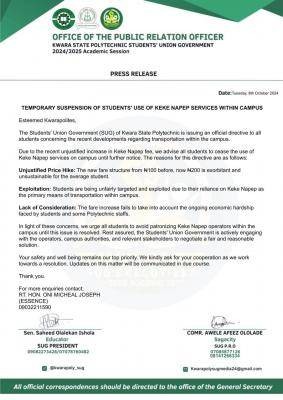
The Dean, School of Postgraduate Studies, Tai Solarin University of Education, Ijagun, Ogun State, Prof. Segun Ogunsaju, at a valedictory lecture in Lagos, proposes ways out of mass failure in public examinations, SAMUEL AWOYINFA reports
The Dean, School of Postgraduate Studies, Tai Solarin University of Education, Ijagun, Ogun State, Prof. Segun Ogunsaju, has expressed concern about the continued trend of mass failure of candidates in public examinations in the country. He said if this trend was not checked, the nation’s search for socio-economic, political and academic development would be truncated.
Ogunsaju said this while delivering the valedictory lecture of Providence Heights Secondary School, Iju, Lagos, on Thursday. In the lecture titled, ‘Education and the Challenges of Students’ Poor Performance in the National Examinations: The Public Outcry,’ the professor of Educational Management said that since 2005, less than 35 per cent of candidates who sat for public examinations, including the West African Senior Secondary Certificate Examinations, had obtained credit passes in five subjects – including English and Mathematics.
This, he noted, was due to factors such as inadequate preparation of candidates, tacit endorsement of examination malpractice by some parents, decay infrastructure in schools, incessant strikes, and inadequate funding of education.
Ogunsaju noted that despite several efforts by government and other stakeholders for qualitative education, there has not been much success.
“The physical structures of many schools are substandard, books are substandard, new examination boards are substandard, the conduct of examinations themselves has become substandard and the standard of English is atrocious,” he added.
He explained that there were also some weaknesses identified with the candidates. These, he said, include shallow knowledge of the subject matter and inadequate coverage of the syllabus, disregard for rubrics and incorrect interpretation of questions, poor command of the English Language, lack of mathematical/manipulative skills and poor knowledge of examination techniques.
Others factors that enhanced failure, he added, were poor attitude towards examination, poor reading culture, illegible hand writings, poor shading techniques, unfamiliarity with contextual passages.
The lecturer also blamed politicians who promised free education but, at the end of the day, failed to deliver for the production of half-baked products by ill-motivated teachers.
Lack of appropriate statistical data, he noted, was another factor affecting the nation’s education system, adding that lack of planning and insufficient manpower had also contributed to the decay.
To get out of the woods, Ogunsaju called for the professionalisation of teaching to make it attractive, because, according to him, quacks and unqualified people dominate the terrain at the moment.
He said, “The need for raising the standards of teacher education in Nigeria became obvious through the effort of moving teaching towards greater professional standing. These days, virtually all the noble aspects of the teaching profession have disappeared. Most teachers are over-worked and underpaid.
“Because of unfulfilling working conditions, the profession no longer attracts committed and dedicated people. Consequently, quacks and unqualified people dominate the profession. Efforts should therefore be made to improve the quality of instruction given in teacher training institutions, while priority should be given; to those who would return to teach in our primary schools; since primary education is regarded as the bedrock of any education system,” he said.
He also explained that practising teachers should be given the opportunity to update their knowledge through in-service programmes in universities and institutes of education during long vacation or through staff development programmes.
Ogunsaju also advocated for the establishment of a National Secondary School Commission, which, he said, would give recognition to those employed in the process of transferring knowledge and enhancing pupils’ cognitive growth.
He also advised parents to desist from encouraging their children to cheat or assist them in cheating, adding that government at all levels should invest more in education.
“They should fund education adequately; improve examination management, scrap special centres, and promote image of teachers through improved welfare package and training,” he said.
At the event where pupils entertained parents and other guests with poetry recitation, cultural performances, among other items, the Principal, Mr. G. E. Abhulimhen, noted that while academic programmes would continue to be at the centre of the providence Heights School’s programmes, it also places importance on extra-curricular activities, all which, he noted, had helped its products in external examinations and even outside school.
The Chairman of the Prent-Teacher Association, Mr. Gbenga Edeyokun, commended the management and staff of the school for their efforts on the overall development of the pupils.
He told the teachers, “Your dedication to duty and spirit of hard work and discipline you instil in your students are paying off yearly. Your students are coming out with outstanding results in their academics and are improving on their morals.”


